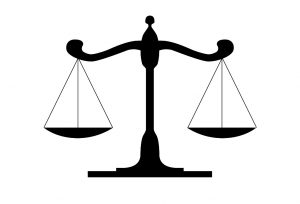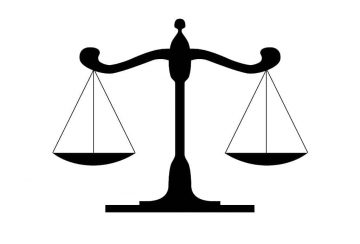
In a Sacrament meeting talk about opposition and the war in heaven, I recently heard the features of Satan’s plan enumerated: he wanted to take away our agency, he wanted God’s glory for himself, there would have been “perfect equality,” and not one soul would be lost.
I consider equality to be an eternal truth of heaven and hearing it listed among the undesirable traits of Satan’s plan took me by surprise. I believe God is No Respecter of Persons, and that all people, black and white, bond and free, male and female are alike unto God. Even if Satan’s plan of salvation did offer us “perfect equality,” it doesn’t mean that we forfeit earthly equality by choosing God’s plan instead.
Equality is a foundational piece of God’s plan: we are equal in the amount of love God has for us, we are equal in how the Atonement of Jesus Christ can cover our sins and shortcomings, we are equal in our worth to God, equal in our potential to be like God and inherit His blessings. The difference between God’s equality and Satan’s equality comes down to agency. It is every bit God’s intention to make of us an equitable people, but we must CHOOSE it. Equality will never be forced upon us.
We must choose to recognize equality as an eternal truth and make it a personal value, exemplified by individual behaviors. We must use our agency to enact equality. We must view inequality as sin and combat it.
For too long, the marginalized groups in our societies have been victims of man-made patriarchy and white supremacy, which structures exist because imperfect humans made inequitable choices over eons of time, unfairly subjugating innumerable people along the way. It is not pleasing to God. It is sin. Pride, and an unwillingness to choose equality are among the most harmful of sins.
We must recognize these sins in ourselves. We must choose equality.
Equality is a feature of a true Zion community, “And the Lord called his people Zion, because they were of one heart and one mind, and dwelt in righteousness; and there was no poor among them.” It is taught by the Savior, Jesus Christ, “Whatsoever ye would that men should do to you, do ye even so to them.”
Even so, the 3-degrees-of-glory version of God’s plan does not make equal outcomes automatic. Someday we will be sorted according to our earthly diligence, indicated by what sort of resurrected body we get and when, then by what kingdom we’re assigned to inhabit. Apparently our agency and freedom to choose are so important that they are worth the collateral damage of some of God’s children never returning to His presence.
So what are we going to do about it?
It’s on us to use our agency to help everyone, then let God sort out the rest.
The whole city of Enoch, every person who lived in it plus the dirt it was built on, was received up into the bosom of God. This is an example of a 100% success rate of celestial salvation. Who can we credit for such an amazing feat? The people of Enoch, who were of one heart and mind, and who had no poor among them! They chose equality, and look where they ended up! Oh, that we all should be such effective keepers of our sisters and brothers!
Imagine this scenario between two young playmates: the first child finds an unused toy and begins playing with it. A second child, observing the great fun the first child is having, asks for a turn. What should the adult in the room do? Cite “finders, keepers” and let the first child keep the toy? Enforce equal time limits with the toy and require both to share? Find another version of the toy so they both have the same? Let them fight it out and see who comes out on top? (whose plan do these remind you of?)
Or
Help the second child articulate their request. Help the first be self-aware, compassionate and charitable, noticing that someone else wants a chance to have the same joy she is currently experiencing. Bring the first to a higher consciousness, where she can stay to herself, “I like this toy. I’m having fun. I don’t want to give it up, and I had it first. It looks like my friend wants a turn with this toy. If I let my friend have a turn, then she will be happy, too. And I want my friend to be happy, even if I give up part of my turn. We can play together and I can have another turn again soon.”
Everyone loves to be shared with. It’s much harder to be the one doing the sharing. Especially if we’re the ones who had the toy in the first place, making choices for equality can seem like we’re giving up our power, our entitlements, and our privileges. For the more privileged person in the situation, choosing equality can seem like a sacrifice, even oppression. For the under privileged person in the situation, it’s a step toward fairness and opportunity. While the highly privileged person already has an exercise of greater agency, bringing equality to others is accompanied by more meaningful agency all around.
This is the exercise of true charity. This is living the higher law. This is building a Zion society.
To the Pharisees, Jesus Christ reminds them of the “great commandments in the law,” to Love God, and to Love thy neighbor as thyself. Later he gives a new commandment, a third commandment, that we love one another as He has loved us, that we also love one another. In addition to loving God, loving our neighbor, loving ourselves, we now have new instruction to love others as Christ loves us. It begs the question, Who and How does Christ love?
He loves the marginalized. He loves the women, the children, the poor, the sick, the lame, the outcast, the downtrodden, the mentally ill, the sinners. He shows them mercy, tenderness, healing and kindness. He despises only the power-hungry, prideful abusers. Combating systemic oppression, whether institutional racism, sexism or any other -ism, requires effort from both privileged and marginalized people to bring equilibrium. Coming into a societal system that was already flawed, Jesus shows us how to choose equality by bringing up the marginalized. To the lawyer of old and to us today, the instruction is the same, “go and do thou likewise.”
It is said, “the only thing necessary for the triumph of evil is for good people to do nothing.” Working for greater equality is an active pursuit, not a passive one, and a God-given commandment to do so at that.






11 Responses
Thank you for this. I’ve been thirsting for a Gospel response to the horror of the last few weeks and really struggled when what I got in sacrament meeting was a talk on how the Constitution was written by God. This is what I hoped for.
All I can say about this is YES!!! Thank you!
“The people of Enoch, who were of one heart and mind, and who had no poor among them! They chose equality, and look where they ended up!”
There is a difference to their “equality” than the “equality” of today. Their “equality” put God first. They were not choosing to abort their children, obviously they were not having “relations” outside the bonds of marriage, nor was there an issue with the “equality” of marriage. Satan’s “equality” is reigning here on Earth, while those in Enoch cherished Heavenly Father’s “equality” and are reigning with him.
In the D&C there is a scripture that explicitly states that because of inequality, “the world lieth in sin.” (49:20) I never hear it quoted, and it’s not on the official scripture mastery list, but it’s meaningful to me. We live in a world of random horror, unfair privilege, and banal inequality; I believe that’s by design, and the only way to correct it is through the exercise of someone’s agency. Might as well be mine.
Brilliant reference! Thank you for sharing. I noticed the footnote references to that verse are enlightening as well: D&C 51:3, 70:14, and 78:6. In my mind, I can put in any modifier in front of equality (racial, gender, income) and they all read with power!
Yup, I’ve followed those footnotes that strengthen the case that this world is fallen because of privileges and the resulting inequalities. And I believe God allows it in order to provide us with a world in which using our agency to create balance is the only way it happens. But you won’t find this perspective in the conference reports.
Amen amen amen from the Episcopal side!
As long as the equality is of God’s definition and not one that is man made.
Beautiful and powerful. My favorite line (among quite a few) is:
“We must use our agency to enact equality.”
I’ve never heard even the idea phrased like that, yet it makes perfect sense. That is going in my mind, heart and actions. I can’t express how much I love the sentence and the gospel / belief supporting it. Magnificent.
I really like your perspective here, Violadiva. This is a great way of thinking about the issue. I particularly like this line: “For the more privileged person in the situation, choosing equality can seem like a sacrifice, even oppression.” So true! Sounds like a lot of American Christians who are lamenting being persecuted when the law dares to put all religions on an equal footing, and don’t allow them to force their religion on others.
Also, I could be wrong on this, but isn’t this idea (Satan’s plan was perfect equality) one that Elder Oaks has popularized? I know he mentioned it earlier this year in Conference: “Satan’s proposal would have ensured perfect equality: it would “redeem all mankind,” that not one soul would be lost.”
https://www.lds.org/general-conference/2016/04/opposition-in-all-things?lang=eng
To me, this framing just seems like applying the word “equality” to something he doesn’t like, so that he can feel more justified in fighting actual equality in the world around us (e.g., for LGBT people). It’s an unfortunate perspective.
Ah, Ziff! you sleuth! That must be where the idea is getting traction. I scoured the standard works and even the teachings of Joseph Smith looking for anything like that, to no avail. Thanks for the tip!